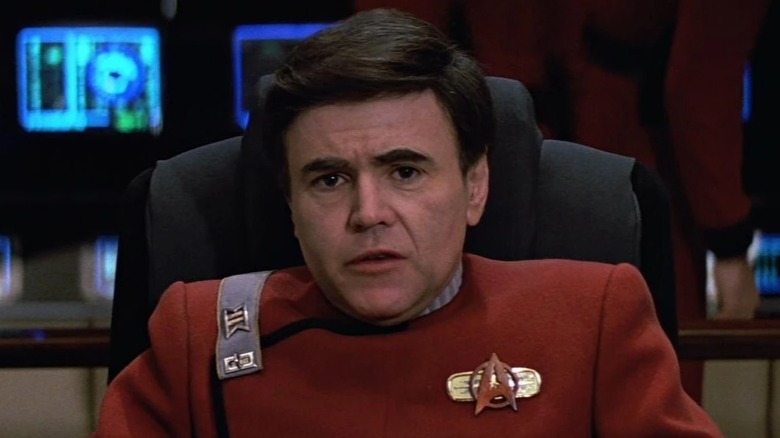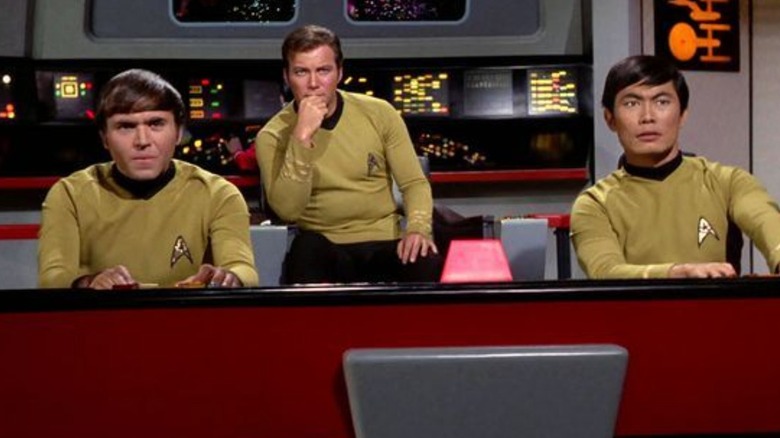The Exact Moment Star Trek's Walter Koenig Knew The Original Series Was Done For
Walter Koenig came to "Star Trek" in only its second season, but he is part of the series' legacy thanks to his role as Ensign Pavel Chekov (not to mention being one of the few major "The Original Series" actors still with us). An American TV show featuring a Russian character as a good guy during the height of the Cold War? That was just one of the ways that "Star Trek" pushed the envelope.
Unfortunately, as you Trekkies reading know, "Star Trek" lasted only two more years after Koenig joined the cast in 1967; NBC canceled the show due to low ratings and the last episode first aired on June 3, 1969. That cancellation wasn't the end for "Star Trek" — it's a full-blown media franchise now — but it seemed like it was at the time.
Recently interviewed by TrekMovie.com, Koenig claims he knew well ahead of time that "Star Trek" wouldn't be making it past season 3:
"In the third season, Jimmy [Doohan], George [Takei], and I did a shoot. We went on a magazine shoot for Kids magazine, it was either Teen or 16 or Fave or something ... But while we were there, while we were astraddle the horse, we got news that guess what, we were being changed: Our showtime in the third season was not going to be eight o'clock Monday night. It was going to be 10 o'clock Friday night. As soon as I heard that — I mean, I was still astride my horse—and I knew [that] was it, that we were done."
Koenig highlights a phenomenon — or curse — in network television: the Friday night death slot.
The Friday Night Death Slot
For most of television's existence, there's been an understanding that 18-35-year-olds don't want to spend their Friday night in front of the TV. Finally, briefly free from their 9-5 job, they'd rather kick off their weekend by going out with friends or dates. Thus, TV shows airing on Friday nights will earn low ratings and be quickly canceled. If a show was moved to a Friday night time slot, it was historically treated as a sign that the network had lost faith in it.
Some of the Friday night death slot's more recent victims include "Firefly," "Terminator: The Sarah Connor Chronicles," and "Happy Endings." "Star Trek" was one of the earliest and most infamous casualties. However, the reasons behind the trend are intuitive; even in the 1960s, when television was relatively new and "Star Trek" was still in production, Koenig understood what the time slot move meant. He told TrekMovie.com:
"I'm cynical by nature. And I knew that I would not have the same audience that I would at eight o'clock on Monday. They had brought me aboard for the very obvious reason of appealing to very young people, literally eight to about fourteen years old. And at Friday night at 10, they're either in bed, the eight-year-olds, or they're out at a party or at a date or something, the fourteen-year-olds. So at that moment, I knew that our fate was sealed, and that the third season of 'Star Trek' would be the end."
Young adults today are lonelier and more introverted than in the 20th century, but even if they're staying inside, traditional network and cable TV (which relied on advertising revenue, hence the importance of high ratings at particular time slots) have been largely displaced by streaming. The two factors of the Friday night death slot — ratings and social patterns — evolved in ways that canceled each other out.

